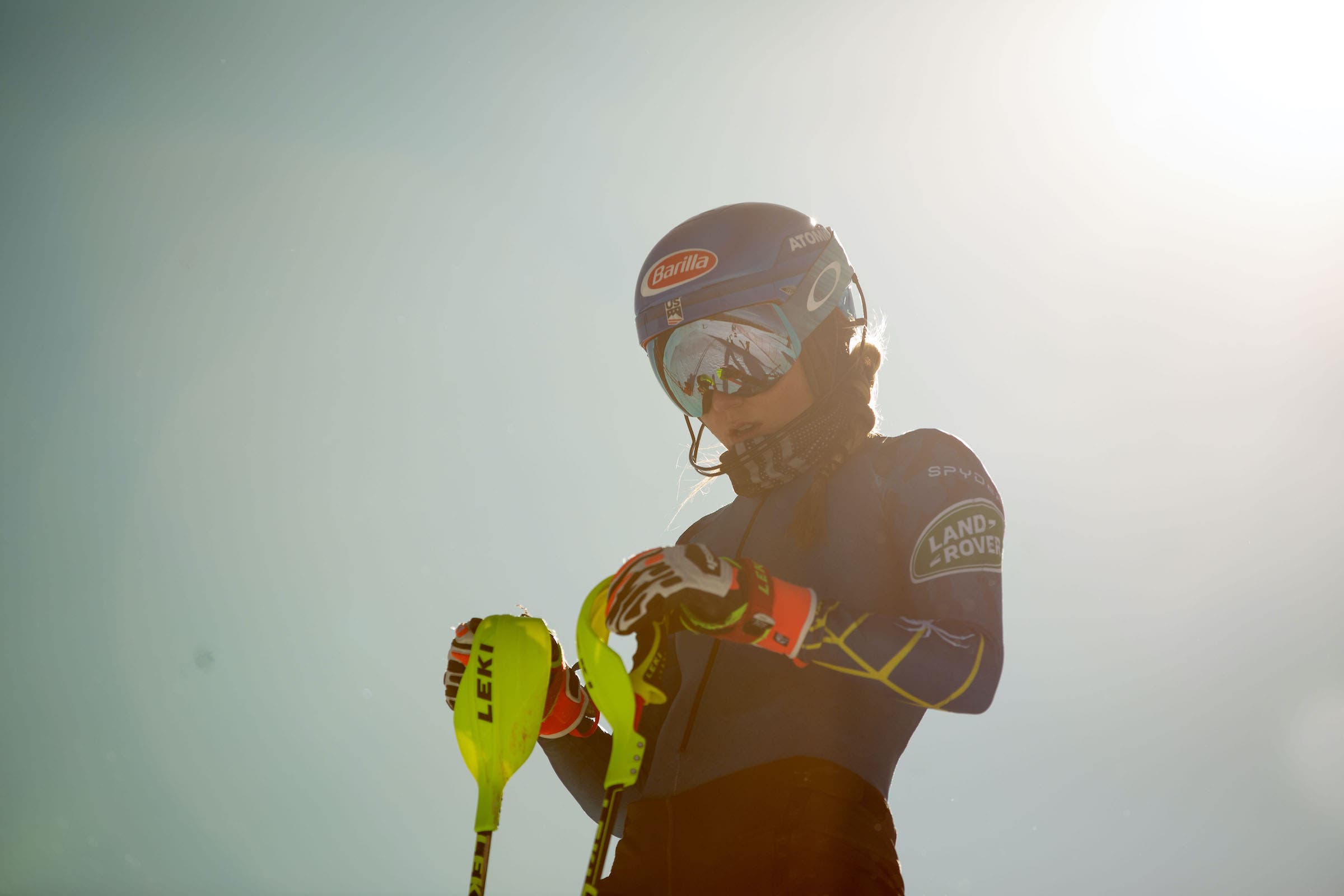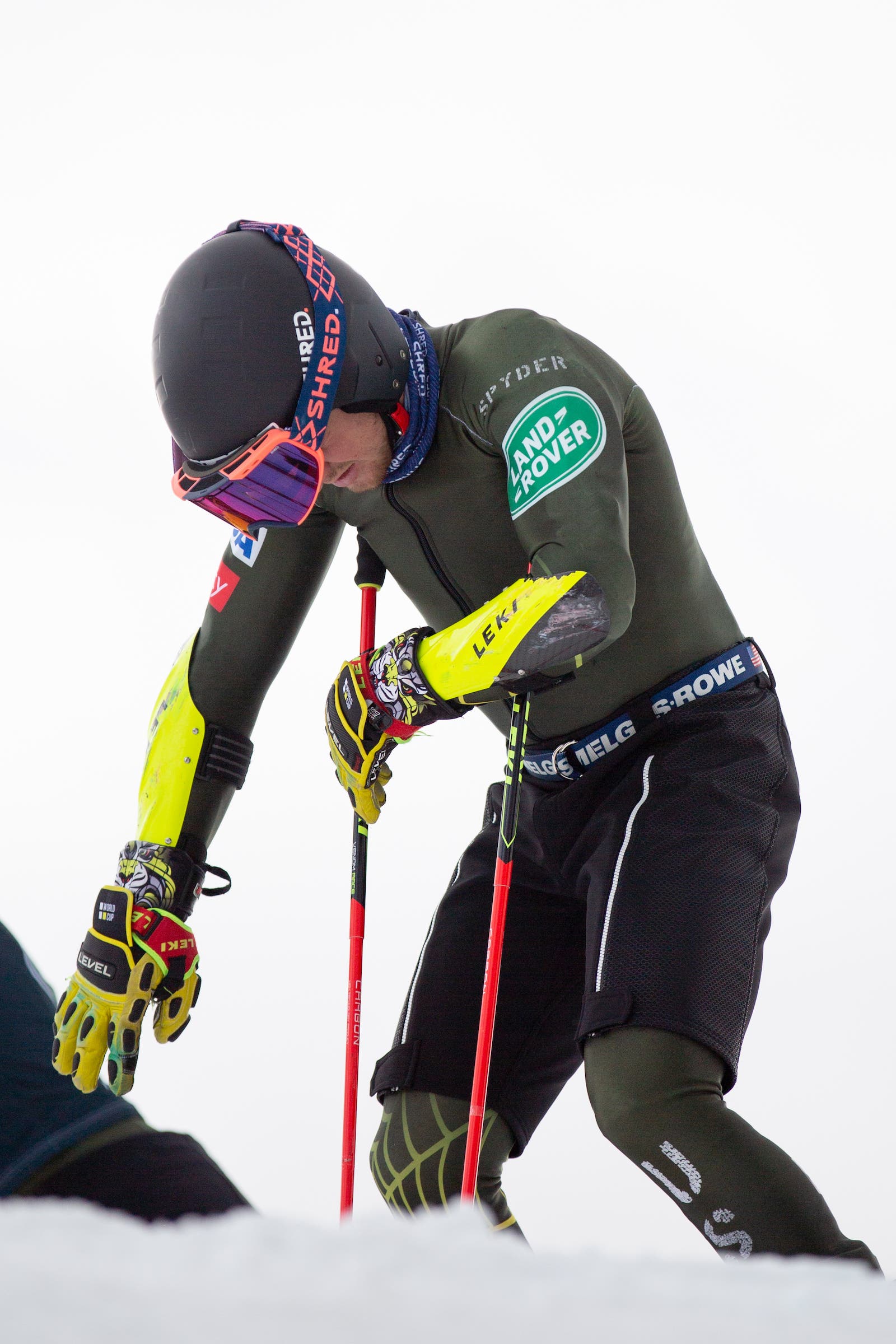What the U.S. Ski Team Psychologist Says Make the Best Athletes, Well, The Best

Mikaela Shiffrin mentally zeroes in on what she needs to do in the race course at U.S. Ski Team training at Copper Mountain, CO. (Photo: U.S. Ski and Snowboard)
Join Outside+ to unlock exclusive instructional videos and skiing tips from the best pros in the biz. Here’s to enjoying your best ski season yet.
What makes Mikaela Shiffrin so mesmerizing to watch when she races is her fluidity. Unlike other racers who throw themselves down a slalom or GS course with reckless abandon, Shiffrin skis methodically, meticulously, elegantly. After she crosses the finish line—more often than not, in first place—she might reveal to the media that her winning run was “a huge battle” or that she really had to “fight and push hard” to clinch the win.
But we don’t really see any of that. All we see is an elite athlete who has seemingly cracked the code for how to win, time and time again. Is it her athleticism and technical skill? Of course, she’s one of the best technical skiers in the history of the sport. But what really sets Shiffrin apart is her mental game.
Much has been written about her laser focus and ability to shut out any and all distractions, to the point where she can reportedly take a quick power nap at the top of the race course right before her start. Is this the key to Shiffrin’s—and other elite athletes’—success? According to Alexander Cohen, senior sports psychologist for the U.S. Olympic and Paralympic Committee (USOPC), it’s a big part of it.
Related: What Do Two of the Best Slalom Racers in History Have in Common? Their Ski Tech
“The most successful athletes know how to aim their attention at something that will help them achieve their goals,” explains Cohen. “They don’t get tangled up in thinking about results, or crowds, or injuries. They can make their jobs simpler and just focus on the technical and tactical cues that lead to consistent performance under pressure.”
That’s easier said than done, but it’s Cohen’s job to help the athletes on the U.S. Ski Team get there. We asked Cohen what it takes for athletes like Shiffrin to rise above the others, and whether we, mere mortals, can learn to hack success the same way.
SKI: What’s the job of a sports psychologist, in a nutshell?
Cohen: The simplest way to describe it: My job is to help athletes focus on the right thing, at the right time, every time. At this level, the athletes are so elite and mentally tough. They have a lot of mental strength already, so my job is just to leverage that to help promote consistency in their performance.
SKI: Mentally, what separates the athletes on the top of the podium from the rest?
Cohen: When you get to an elite professional athlete level, everyone is good—everyone is a great skier. So what separates those who are on the podium and those who are just off the podium—it’s not always the best athlete, the person with the best technical skills, or the ones with the perfect wax on their skis. It comes down to who can aim their attention the best.

Athletes who consistently ski well under pressure are those who don’t waste time and energy struggling with their thoughts and feelings right before a race. They’re the ones who can acknowledge them, accept them without judgment, and then aim their attention intentionally on something that’s helpful for skiing.
SKI: So, is positive thinking the key to success?
Cohen: A lot of athletes believe you’re only supposed to think positively because you have to feel great to ski well. Frankly, that’s not true. I think feeling good is overrated. The key is not to try to avoid negative thoughts or feelings, but to create space for them, so that you can aim your attention elsewhere.
Imagine you’re at the top of a difficult course, with thousands of people watching. If you do well, you’ll be on top of the podium. You might then get all these thoughts like, If I can just ski well, I can win, or I just saw someone destroy her knee and she had to get life-flighted out of here. Then you might think, I wish I didn’t have that thought, or, I wish I wouldn’t get nervous.
In the past, we might have tried to change those negative thoughts or fight against them. But that’s really not the approach that I take. Because it’s the mind’s job to give us thoughts and feelings. So if you think about it, it’s really a waste of time and energy to try to block out any of those thoughts and feelings.
The work I do is getting athletes to notice their thoughts, feelings, and perceptions, instead of fighting against them or wishing them away.
SKI: Can we all learn to be as focused as Mikaela Shiffrin?
Cohen: Focus is a skill. Some people may have a natural propensity for it, but it’s definitely a skill that can be learned like any other. Mindfulness practices can help.
I think most people who know something about mindfulness practices think about the awareness part—you know, the idea that you’re just supposed to sit quietly and be aware of your thoughts and feelings. If you just did that part, it might get boring or frustrating.
The practice of mindfulness involves two parts: awareness and attention. The idea here is that if you can be aware that your mind is wandering, or certain thoughts and feelings are trying to steal your attention away from what matters, then you can learn to gently bring it back and aim your attention at something that will help you perform.
SKI: When some of the best athletes in the world describe winning performances, they often talk about finding a flow state. Can the best athletes just tap into flow state?
Cohen: There are a lot of ways to be successful, but I’m interested in sustained, competitive excellence. There are a couple of psychological states underlying performance. One of them is that flow state that everyone has heard about. It may not be a whole run, maybe it’s just linking together a few perfect turns. In flow state, everything just clicks and feels effortless—you’re just totally in the moment.

Flow state is great, but it probably only happens around 10 percent of the time. So you better have a plan for the other 90 percent of the time, when something doesn’t feel good—when the skis feel off, or you’re nervous. Sometimes you can change your energy and calm down, but other times your body is like, nope, here’s some adrenaline, figure it out. And that’s when athletes need to learn not to panic. This is what I refer to as the clutch state.
In a flow state, you don’t have to think about how to aim your attention, it just happens and your skills are executed automatically. Whereas in a clutch psychological state, something might not be easy and it might require much more effort to focus. But your skills can still be executed automatically. When you know that there are outcomes or results involved, it’s hard to find that flow state. So the goal is to train in such a way that you’re ready for the moments when you have to actively deploy your skills.
I should probably come up with a more modern reference, but Mike Tyson used to say “Everybody has a plan until they get punched in the mouth.” If 90 percent of the time you’re not in the flow state, it’s not a big deal if you have a plan. So you have to train in such a way that you have that focus under pressure.
SKI: How can parents help their young athletes perform their best? In other words, how can they avoid screwing them up?
Cohen: This is going to sound obvious, but what your young athlete needs is a parent. They already have a coach. A good example is the car ride home after training or a competition. The athlete knows exactly what they did, they’ve already gotten feedback from their coach.
If you want your child to talk to you, let them bring it up. If they want to talk, I promise they’ll come to you. But the last thing they may want is for you to make suggestions, talk about technique, or rehash the whole training session or competition. You’re well-meaning and it comes from a place of love and trying to help, but be a parent first.
It’s totally appropriate to push your children. But I want you to push them around things like character, values, work ethic, resiliency, and kindness. Kindness, especially, is an interesting one. Research is showing that when there is a focus from parents on developing kindness in their kids, their kids end up being more successful in everything, whether it’s sport, school, or, later in life, business.
So that’s always my hook when I’m talking to parents of high-performance athletes. I don’t preach about taking the high road or not being competitive. I tell them that I want their kids to perform, and to get them to perform, we need to focus on kindness, character, resilience, and those types of things. Because performance depends on them.
Alexander Cohen, a licensed psychologist and certified mental performance consultant, has served as the USOPC’s Senior Sports Psychologist since 2011. When he’s not traveling with USOPC athletes to domestic and international training camps or competitions, you’ll find him working alongside other high-performance specialists at the U.S. Ski and Snowboard Association Center of Excellence in Park City, Utah.
Related Reading
How Mindfulness Practices Can Give You That Pow Day Bliss Every Day
A Pro Racer Turned Pro Big Mountain Skier On Tackling Your Fears
How The Next Great Downhill Avoids Beating Herself Up, Mentally and Physically